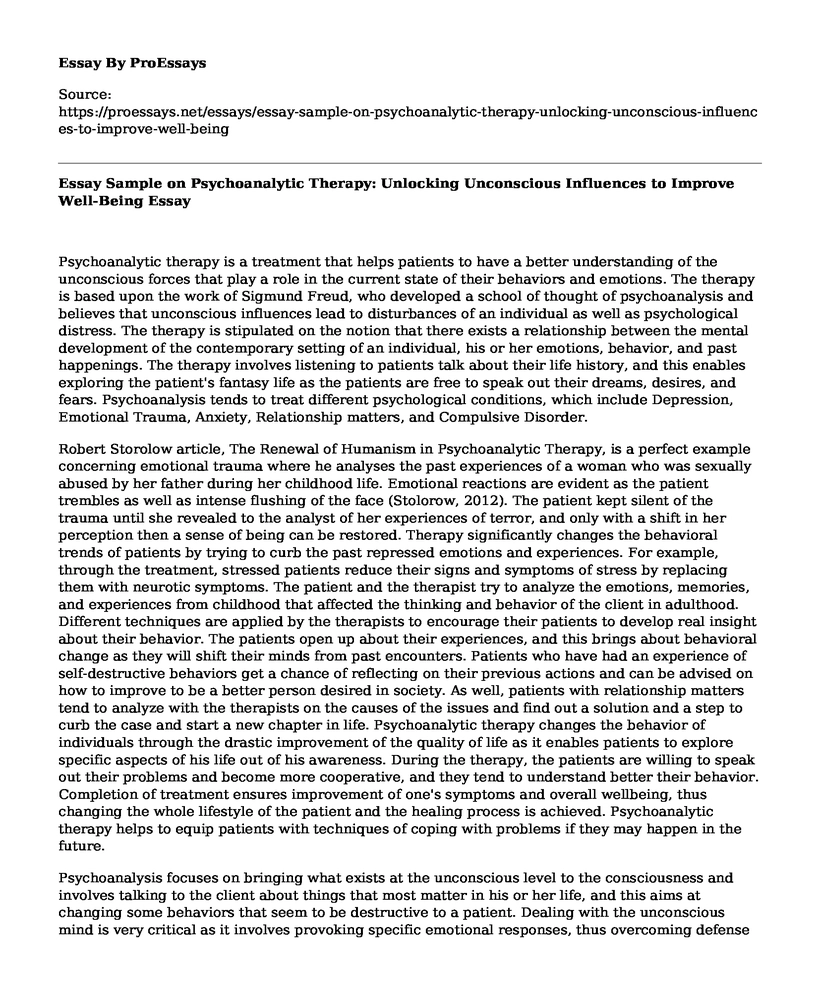Psychoanalytic therapy is a treatment that helps patients to have a better understanding of the unconscious forces that play a role in the current state of their behaviors and emotions. The therapy is based upon the work of Sigmund Freud, who developed a school of thought of psychoanalysis and believes that unconscious influences lead to disturbances of an individual as well as psychological distress. The therapy is stipulated on the notion that there exists a relationship between the mental development of the contemporary setting of an individual, his or her emotions, behavior, and past happenings. The therapy involves listening to patients talk about their life history, and this enables exploring the patient's fantasy life as the patients are free to speak out their dreams, desires, and fears. Psychoanalysis tends to treat different psychological conditions, which include Depression, Emotional Trauma, Anxiety, Relationship matters, and Compulsive Disorder.
Robert Storolow article, The Renewal of Humanism in Psychoanalytic Therapy, is a perfect example concerning emotional trauma where he analyses the past experiences of a woman who was sexually abused by her father during her childhood life. Emotional reactions are evident as the patient trembles as well as intense flushing of the face (Stolorow, 2012). The patient kept silent of the trauma until she revealed to the analyst of her experiences of terror, and only with a shift in her perception then a sense of being can be restored. Therapy significantly changes the behavioral trends of patients by trying to curb the past repressed emotions and experiences. For example, through the treatment, stressed patients reduce their signs and symptoms of stress by replacing them with neurotic symptoms. The patient and the therapist try to analyze the emotions, memories, and experiences from childhood that affected the thinking and behavior of the client in adulthood. Different techniques are applied by the therapists to encourage their patients to develop real insight about their behavior. The patients open up about their experiences, and this brings about behavioral change as they will shift their minds from past encounters. Patients who have had an experience of self-destructive behaviors get a chance of reflecting on their previous actions and can be advised on how to improve to be a better person desired in society. As well, patients with relationship matters tend to analyze with the therapists on the causes of the issues and find out a solution and a step to curb the case and start a new chapter in life. Psychoanalytic therapy changes the behavior of individuals through the drastic improvement of the quality of life as it enables patients to explore specific aspects of his life out of his awareness. During the therapy, the patients are willing to speak out their problems and become more cooperative, and they tend to understand better their behavior. Completion of treatment ensures improvement of one's symptoms and overall wellbeing, thus changing the whole lifestyle of the patient and the healing process is achieved. Psychoanalytic therapy helps to equip patients with techniques of coping with problems if they may happen in the future.
Psychoanalysis focuses on bringing what exists at the unconscious level to the consciousness and involves talking to the client about things that most matter in his or her life, and this aims at changing some behaviors that seem to be destructive to a patient. Dealing with the unconscious mind is very critical as it involves provoking specific emotional responses, thus overcoming defense mechanisms. Psychoanalytic therapy is very is time-consuming and costly, but it is essential in the current world and should be enhanced to solve the disorders of different patients. Patients should be keen on completing their therapy sessions as well as being open to their past experiences to ensure they have achieved behavioral change and healing.
References
Stolorow, R. (2012). The renewal of humanism in psychoanalytic therapy. Psychotherapy, 49(4), 442-444. doi: 10.1037/a0027053
Cite this page
Essay Sample on Psychoanalytic Therapy: Unlocking Unconscious Influences to Improve Well-Being. (2023, May 09). Retrieved from https://proessays.net/essays/essay-sample-on-psychoanalytic-therapy-unlocking-unconscious-influences-to-improve-well-being
If you are the original author of this essay and no longer wish to have it published on the ProEssays website, please click below to request its removal:
- John B. Watson's Concept of the Behaviourist Manifesto Essay
- Stages of Cognitive Development Paper Example
- Essay Sample on Impact of Lifestyle Choices on Health
- Research Paper on Mental Health Challenges: 80% Affected by Social, Emotional Factors
- Paper Example on Roleplaying: A Therapeutic Tool for Self-Exploration
- Overcome Fear of Flying - One in Three Americans Affected - Essay Sample
- Essay Example on Emotions Among the Various Cultures







